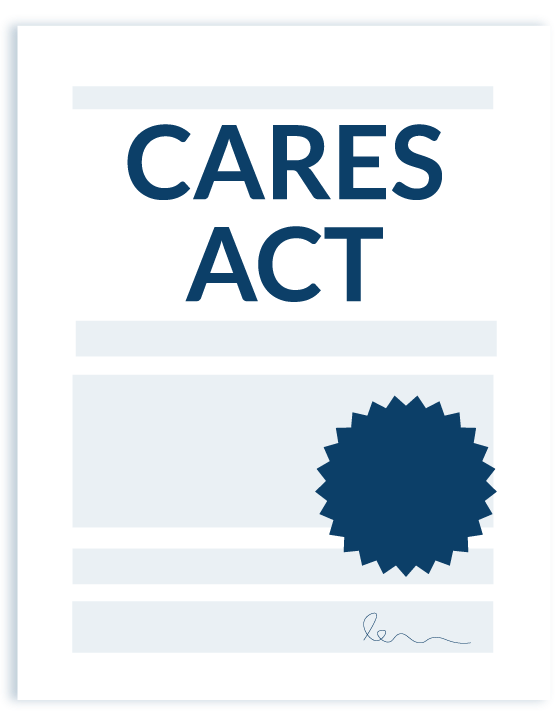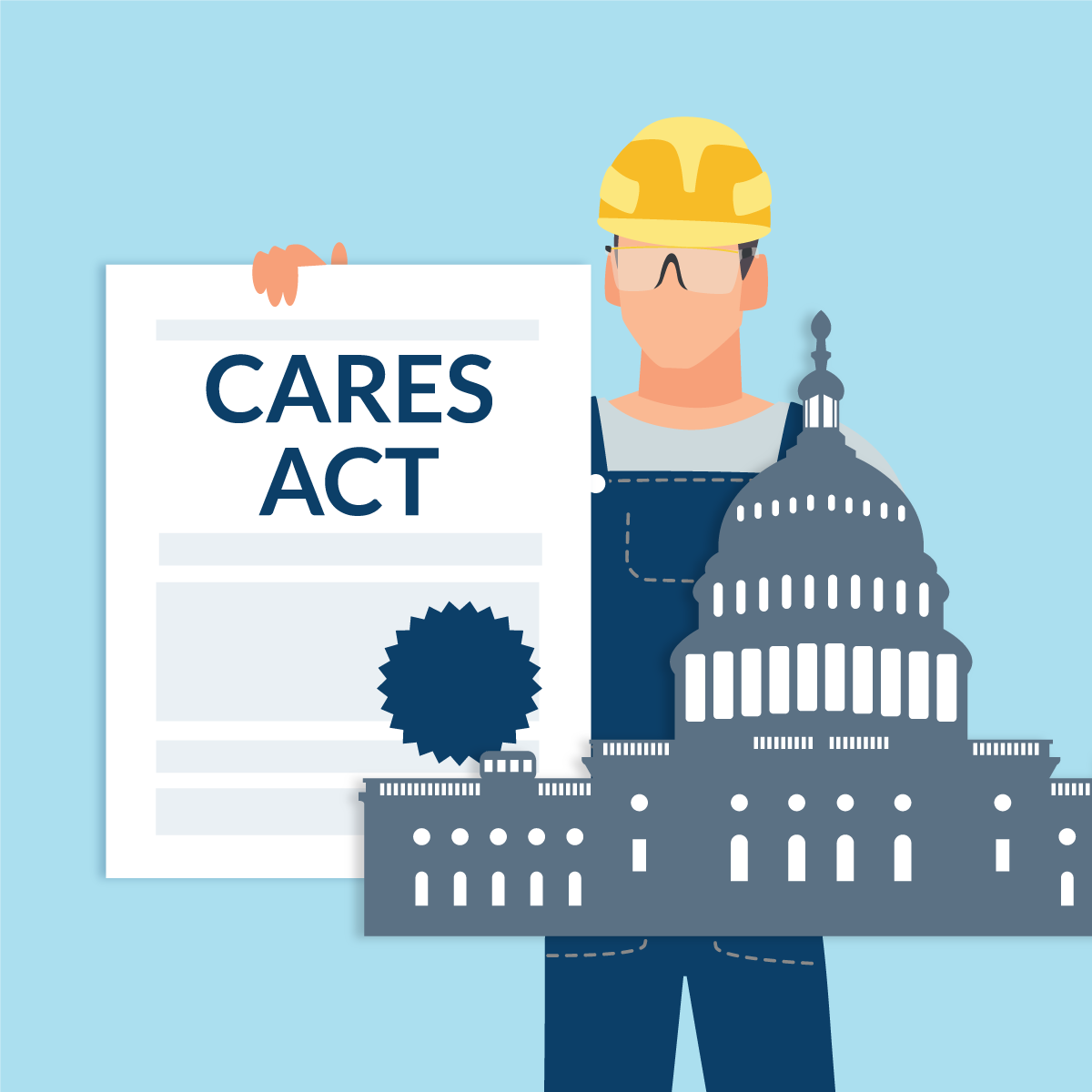

What will construction businesses get from the coronavirus bill?

The majority of construction businesses in the US will likely qualify for business loans in the package (which are forgiven if you meet the requirements). The bill will also give cash directly to their workers. But even beyond direct cash payments, loans, and grants, contractors and suppliers may benefit from investments in new or existing projects.
In particular, contractors who work on healthcare and public works projects could see a sharp uptick in jobs as infrastructure and hospital projects get off the ground quickly. In most states and cities so far, construction in general is considered an essential business, and projects are being allowed to continue even as governors issue stay-at-home orders.
But in states where construction is shut down, the CARES Act could reinvigorate projects in critical industries. Pennsylvania, for example, shuttered all “non-life-sustaining” business – including most construction. Meanwhile, construction on Penn Hospital’s $1.5 billion expansion is full speed ahead, considered a critical project to meet expected demand from COVID-19.
The $2 trillion in the coronavirus stimulus bill is divided among aid to individuals in (and recently pushed out of) the workforce, businesses, and local governments.
Money for construction workers (& their families)
Direct payments
The stimulus package provides direct payments to individuals, whether they have been laid off or are still working. US adults would receive $1,200 each, with an additional $500 per child in the family. The payment is reduced for workers who earn over $75,000 annually (or $150,000 as a household).
The IRS will distribute these payments as tax refunds so they can get the money into US workers’ hands quickly. View the IRS webpage for Coronavirus Tax Relief. You don’t necessarily need to file your 2019 taxes in order to receive the money. As long as you filed taxes in 2018, the IRS will either mail you a check or direct deposit the money into the account they have on file.
Unemployment benefits
The bill also temporarily increases unemployment benefits for workers laid off because of this pandemic. The bill hopes to replace lost wages as much as possible. The bill increases benefits by $600 per week – above the normal unemployment benefit – for a period of four months.
According to the US Department of Labor, workers don’t necessarily need to be laid off to receive unemployment benefits during the COVID-19 pandemic.
The DOL says that workers may qualify for unemployment benefits if:
- Their employer closes down due to COVID-19, preventing employees from coming to work;
- The worker is quarantined but expects to come back to to work after the quarantine is over; and
- An individual leaves employment due to a risk of exposure or infection or to care for a family member.
Visit the Unemployment Benefits Finder for information on how to apply for unemployment benefits in your state.
Small business loans for construction businesses
Construction businesses with less than 500 employees will be able to access “paycheck protection loans” to help them pay wages, rent, and other overhead costs. These loans are guaranteed by the US Small Business Association (SBA), and distributed through their existing 7(a) small business loan program.
Learn more about the SBA Paycheck Protection Loan program and how to apply
How much can I borrow?
For each business, the maximum loan amount will be 2.5 times the company’s average total monthly payroll costs. The maximum available for each business is $10 million.
(For the purposes of calculating these loans, payroll costs do not include prorated wages for salaries of more than $100,000/year, or wages to employees outside of the US.)
Does my construction business qualify for a loan?
Generally, any business with less than 500 employees will qualify, with a few exceptions. The majority of contractors and suppliers in the US will likely meet the bill’s definition of “small business,” including sole proprietors or self-employed construction workers.
In addition, your construction business must have been up and running before February 15th, 2020.
What can I use the money for?
Companies can use these funds to pay their workers and provide employee benefits like healthcare. They can also use the money to cover certain overhead costs, like rent, utilities, and interest on debt. As long as you use the money for these approved expenses, you won’t need to repay it.
The bill also expands the SBA’s disaster loan program for small businesses that they announced previously. This loan program also provides an emergency advance of up to $10,000 for maintaining payroll and benefits, meeting increased supply chain costs, paying rent, and repaying loans.
When do I have to pay back the loan?
While the “payroll protection” funds are technically loans, as long as businesses use them to keep their workers on staff, and pay other approved expenses, the loanswill be forgiven. They essentially become grants if you follow the rules.
Generally, the stimulus bill requires that you use the money to meet payroll (without cutting staff or wages), and pay rent and utilities. Contractors and suppliers who take advantage of these funds will definitely want to keep detailed records. Loan forgiveness won’t be automatic. You will need to show documentation of full time equivalent employees (FTEE) and their pay rates, mortgage and utility payments, etc. If you don’t already have a good document retention strategy, now would be a good time to put one into action.
How to apply for a small business loan
Under the coronavirus bill, businesses will be able to apply for a loan directly from a bank or credit union. While the Small Business Administration has already approved about 1,800 banks across the country, Treasury Secretary Steven Mnuchin said they plan to relax the rules during the coronavirus crisis to make it easier to get money. He expects that just about any FDIC-insured bank will be allowed to make SBA loans. View the US Small Business Association’s Guide to Loan Resources During Coronavirus.
Check with your existing construction lender about applying for an SBA 7(a) small business loan.
Levelset can also help construction businesses understand and apply for SBA loans, in addition to other sources of cash and funding. Find out how we can help.
Other benefits in the coronavirus bill
Loans for large corporations
The bill contains about $500 billion to support corporations in the hardest-hit industries with loans and other aid, particularly airlines. Companies that keep employing workers may be eligible for a tax credit. Corporations will also be able to defer tax payments, and immediately expense construction costs for property improvements.
Tax benefits for businesses
The stimulus bill allows businesses to defer payroll taxes for the rest of 2020. You’re not off the hook for those taxes entirely, though you can pay half of them in 2021 and the other half in 2022.
Cash flow is hard to manage in normal times for contractors and suppliers – even more so while jobs are being delayed or cancelled. A tax deferral could help construction businesses free up some additional cash for the remainder of the year.
Support for local governments
The package includes $150 billion to be available for state and local governments.
Other CARES Act help for construction businesses
The coronavirus bill could create more investment in construction
While construction isn’t on the Department of Homeland Security’s list of “critical industries,” it is considered an essential part of the recovery process. Every critical sector, like healthcare, energy, and defense, is investing large amounts of money in repairing, upgrading, and building new facilities and infrastructure that help them deal with the crisis.
Construction projects – especially those in certain industries – are seen as critical right now. A significant amount of money in the stimulus bill is set aside for specific uses that help attack and recover from the pandemic:
- $156 million for “the study of, construction of, demolition of, renovation of, and acquisition of equipment for vaccine and infectious diseases research facilities.”
- $100 billion in emergency grants to hospitals. The bill allows the money to be used for new construction projects to increase patient capacity.
- $3.5 billion for Biomedical Advanced Research and Development Authority that “may be used for the construction or renovation of U.S.-based next generation manufacturing facilities, other than facilities owned by the United States Government.”
- $150 million “to prevent, prepare for, and respond to coronavirus, domestically or internationally, including to modify or alter existing hospital, nursing home, and domiciliary facilities in State homes.”
Education, training & advising to help construction businesses adapt
The stimulus package includes money for organizations to provide training and advising to small businesses about applying for federal resources, and updating business practices to deal with the effects of COVID-19.
This money would likely go to community organizations that partner with the Small Business Administration to deliver training and resources to local businesses.
One of the biggest impacts we’ve seen from the coronavirus response is the quick transition to remote and digital work. The construction industry is still heavily reliant on paper processes – submitting pay applications, daily logs, reporting, sending paper checks, etc.
While many contractors and suppliers have digitized their processes, and adopted software to manage the lion’s share of them, others still rely on paper and pen. This part of the stimulus could help bring a lot of construction businesses into the 21st century, giving them the training and advice they need to improve productivity and real-time reporting.
Is the CARES Act enough to get construction businesses through?
Whether or not this stimulus package will help dig the US out of the economic hole – and prevent a recession – remains to be seen. Some are already predicting that the $2 trillion won’t be nearly enough to prevent a recession.
Whether you expect a recession or economic turnaround, construction businesses should be taking steps now to protect their business, get paid, and get access to the cash they need. Contractors and suppliers that act quickly will be in the best position to make it through the worst of the coronavirus impact on construction – and survive in any economy.


